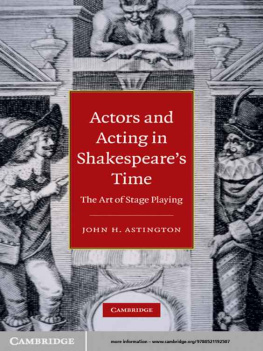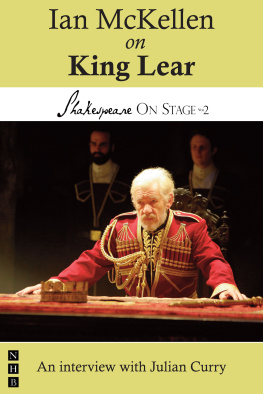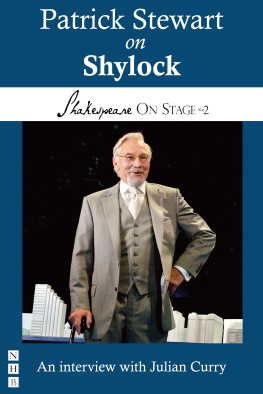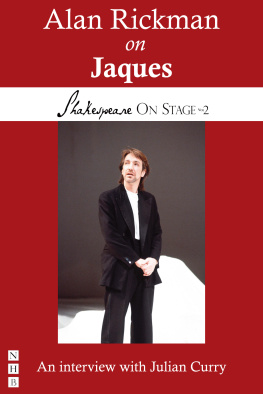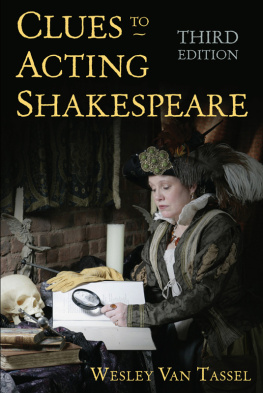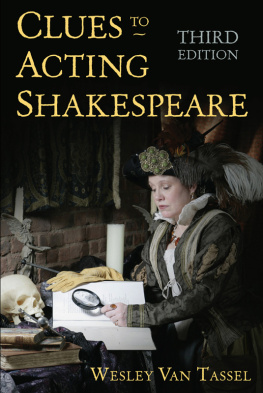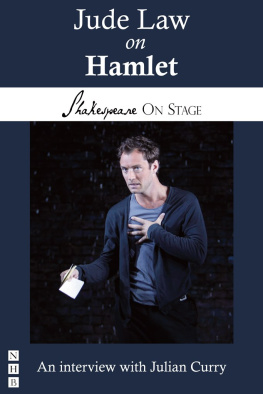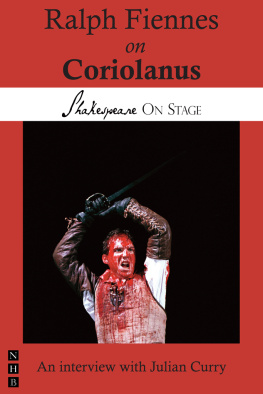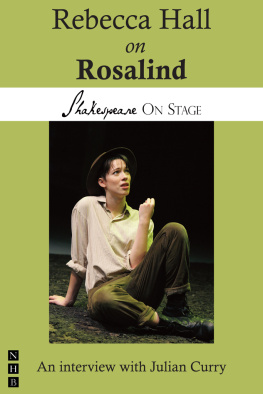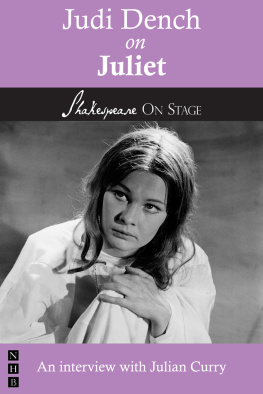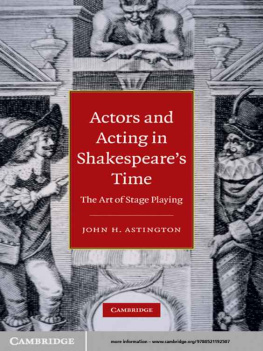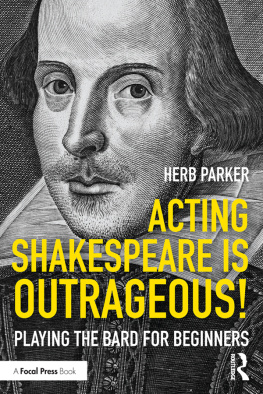Actors and Acting in Shakespeares Time
John Astington brings the acting style of the Shakespearean period to life, describing and analysing the art of the player in the English professional theatre between Richard Tarlton and Thomas Betterton. The book pays close attention to the cultural context of stage playing, the critical language used about it, and the kinds of training and professional practice employed in the theatre at various times over the course of roughly 100 years 15581660. Perfect for courses, this up-to-date survey takes into account recent discoveries about actors and their social networks, about apprenticeship and company affiliations, and about playing outside the major centre of theatre, London. Astington considers the educational tradition of playing, in schools, universities, legal inns and choral communities, in comparison to the work of the professional players. A comprehensive biographical dictionary of all major professional players of the Shakespearean period is included as a handy reference guide.
JOHN H. ASTINGTON is Professor in the Department of English and the Graduate Centre for the Study of Drama at the University of Toronto. He is the author of English Court Theatre, 15581642 (Cambridge, 1999), and has published articles and chapters in many books and journals including The Cambridge Companion to Shakespeare , The Cambridge Shakespeare Library , The Oxford Handbook to Early Modern Theatre and The Oxford Dictionary of National Biography .
Actors and Acting in Shakespeares Time
The Art of Stage Playing
CAMBRIDGE UNIVERSITY PRESS
Cambridge, New York, Melbourne, Madrid, Cape Town, Singapore, So Paulo, Delhi, Dubai, Tokyo, Mexico City
Cambridge University Press
The Edinburgh Building, Cambridge CB2 8RU, UK
Published in the United States of America by Cambridge University Press, New York
www.cambridge.org
Information on this title: www.cambridge.org/9780521140775
John H. Astington 2010
This publication is in copyright. Subject to statutory exception and to the provisions of relevant collective licensing agreements, no reproduction of any part may take place without the written permission of Cambridge University Press.
First published 2010
Printed in the United Kingdom at the University Press, Cambridge
A catalogue record for this publication is available from the British Library
Library of Congress Cataloguing in Publication data
Astington, John.
Actors and acting in Shakespeare's time : the art of stage playing / John H. Astington.
p. cm.
ISBN 978-0-521-19250-7 (hardback)
1. TheaterEnglandHistory16th century. 2. TheaterEnglandHistory17th
century. 3. Shakespeare, William, 15641616Stage historyTo 1625. 4. Shakespeare, William,
15641616Stage historyEngland. 5. ActingHistory16th century. 6. ActingHistory17th
century. I. Title.
PN2589.A88 2010
792.094209031dc22
2010025719
ISBN 978-0-521-19250-7 Hardback
ISBN 978-0-521-14077-5 Paperback
Cambridge University Press has no responsibility for the persistence or accuracy of URLs for external or third-party internet websites referred to in this publication, and does not guarantee that any content on such websites is, or will remain, accurate or appropriate.
Contents
Illustrations
Acknowledgments
The preparation of any larger study draws on a long period of reading, thought, and conversation, the consequences of which are cumulative, and hard to disentangle retrospectively. I am grateful for the help, encouragement, and criticism of colleagues in the theatre history seminar of the Shakespeare Association of America over a long period, including those of people I can no longer thank in person: Tom King, Herb Berry, and Scott McMillin. In the immediate period of the planning and writing of this book I have been grateful for the help and advice of Catherine Belsey, Susan Cerasano, Roslyn Knutson, Lucy Munro, Roger Bowers, Alan Nelson, David Kathman, Chris Matusiak, Andrew Gurr, Lawrence Manley, Peter Blayney, Martin Butler, Helen Ostovich, Marta Straznicky, and Eva Griffith. I would like to thank David Beasley, Librarian of the Goldsmiths Company, Penelope Fussell, Archivist of the Drapers Company, and D. E. Wickham, Archivist of the Clothworkers Company, for their ready and courteous help in research matters. My own university granted me an administrative leave in 20078, during which much of my writing was done; I am grateful to the Master and Fellows of Corpus Christi College, Cambridge, for the award of a Visiting Fellowship during that period, allowing me to work in pleasant and supportive surroundings, the former haunts of Marlowe and Fletcher. Sarah Stanton of Cambridge University Press has provided steady encouragement and wise guidance of the project. To my wife Janet, who has endured my obssession, my thanks for her patience and support.
Introduction: the purpose of playing
In calling the school he founded in 1619, built and endowed with the money he had partly earned from acting, the College of Gods Gift, Edward Alleyn recognized that talent on the stage is not entirely a matter of conscious human disposition, as is also the case in any of the arts. One cannot become a good actor simply by wanting to be one. We still speak of a gift for music, without which the most advanced and meticulous technical skill will not produce an outstanding player or composer. That human gifts for one accomplishment or another came from God was widely recognized in Shakespeares time; even Dogberry in Much Ado About Nothing modestly defers to his creator the credit for his superior deductive powers. Alleyns establishment was not to be a school for the arts or a dramatic academy and the lack, largely speaking, of such institutions in England before the later seventeenth century will form one theme of this book but an academic school for middle-class boys, in the tradition of such charitable foundations from the early Tudor period onwards, to produce, eventually, the future lawyers, clergymen, and civil servants the nation required. Gods gift to Alleyn was not to be rewarded by fostering similar gifts in others, save as a part of his professional life as an active player in one of the leading theatre companies, and his consequent influence on his junior colleagues and apprentices, which was largely over by 1600. The players role as an instructor will provide a second major theme of the study that follows.
In becoming the benefactor of a school perhaps Edward Alleyn, like many modern donors to educational institutions, was recognizing his own lack of an advantageous start in life, in terms of social rank and opportunities, at least. Elizabethan England was, of course, quite different from modern Western societies in the ways in which its educational systems worked and in how they served social and cultural structures. Modern measures that correlate the formal educational experience within populations to economic attainment and to social and political development will not fit the conditions of sixteenth- and seventeenth-century England. University education in Shakespeares day, for example, was restricted to a very small percentage of the population, entirely male, determined largely by rank and social expectations. University education was the very rare exception among contemporary actors the actor-playwright Thomas Heywood spent some years at Cambridge, without graduating, and a number of other playwrights either were university graduates or had experience as students but all players would have experienced at least a few years of schooling, of one kind or another. It is frequently assumed that the boy William Shakespeare attended Stratford Grammar School (although no contemporary document confirms his attendance), where he would have learnt to read and compose in Latin; although we cannot be certain about his schooling it is likely that he first acquired his evident familiarity with classical authors in his teenage years, rather than later. Ben Jonson certainly attended Westminster School, where he was taught by William Camden, and he may have been admitted to Cambridge, although he did not attend for long, while Cave Underhill, a leading comic actor after the Restoration, was a pupil at the famous Merchant Taylors School in London before the civil wars. At the very least even the youngest actors had to be literate, in order to read the scripts they had to learn. Good memory a gift of God commented on by several contemporary educational theorists was, and is, a secondary requirement of any successful actor.


